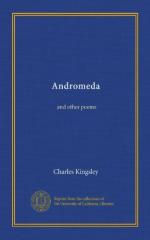Gather you, gather you, hounds of hell—
Famine, and Plague, and War;
Idleness, Bigotry, Cant, and Misrule,
Gather, and fall in the snare!
Hireling and Mammonite, Bigot and Knave,
Crawl to the battle-field, sneak to your grave,
In the Day of
the Lord at hand.
Who would sit down and sigh for a lost age of gold,
While the Lord of all ages is here?
True hearts will leap up at the trumpet of God,
And those who can suffer, can dare.
Each old age of gold was an iron age too,
And the meekest of saints may find stern work to do,
In the Day of
the Lord at hand.
On the Torridge, Devonshire,
September 10, 1849.
A CHRISTMAS CAROL
It chanced upon the merry merry Christmas eve,
I went sighing past the church across
the moorland dreary—
’Oh! never sin and want and woe this earth will
leave,
And the bells but mock the wailing
round, they sing so cheery.
How long, O Lord! how long before Thou come again?
Still in cellar, and in garret,
and on moorland dreary
The orphans moan, and widows weep, and poor men toil
in vain,
Till earth is sick of hope deferred,
though Christmas bells be cheery.’
Then arose a joyous clamour from the wild-fowl on
the mere,
Beneath the stars, across the snow,
like clear bells ringing,
And a voice within cried—’Listen!—Christmas
carols even here!
Though thou be dumb, yet o’er
their work the stars and snows are singing.
Blind! I live, I love, I reign; and all the
nations through
With the thunder of my judgments
even now are ringing.
Do thou fulfil thy work but as yon wild-fowl do,
Thou wilt heed no less the wailing,
yet hear through it angels singing.’
Eversley, 1849.
THE OUBIT {260}
It was an hairy oubit, sae proud he crept alang,
A feckless hairy oubit, and merrily he sang—
’My Minnie bad me bide at hame until I won my
wings;
I show her soon my soul’s aboon the warks o’
creeping things.’
This feckless hairy oubit cam’ hirpling by the
linn,
A swirl o’ wind cam’ doun the glen, and
blew that oubit in:
Oh when he took the water, the saumon fry they rose,
And tigg’d him a’ to pieces sma’,
by head and tail and toes.
Tak’ warning then, young poets a’, by
this poor oubit’s shame;
Though Pegasus may nicher loud, keep Pegasus at hame.
Oh haud your hands frae inkhorns, though a’
the Muses woo;
For critics lie, like saumon fry, to mak’ their
meals o’ you.
Eversley, 1851.
THE THREE FISHERS
Three fishers went sailing away to the West,
Away to the West as the sun went
down;
Each thought on the woman who loved him the best,
And the children stood watching
them out of the town;
For men must work, and women must
weep,
And there’s little to earn,
and many to keep,
Though the harbour
bar be moaning.




